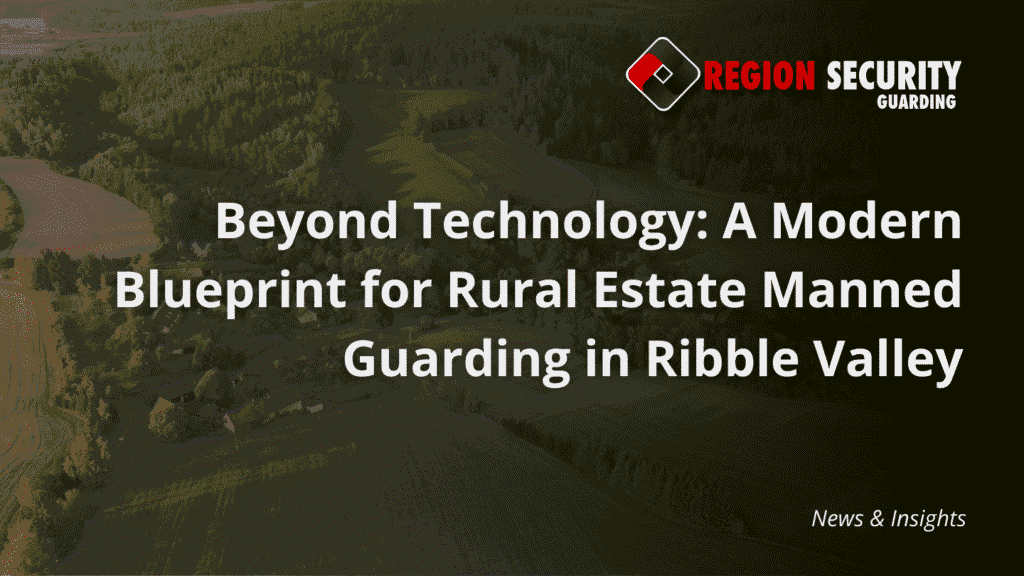Rural estates are more than homes. It includes working farms, heritage properties, and sprawling grounds. Their size and mix of uses make them vulnerable to theft, trespassing, and other security risks.
While technology plays an important role, it cannot replace the value of trained guards on the ground. That is where rural estate manned guarding in Ribble Valley becomes vital.
Guards offer quick responses, act as visible deterrents, and have local knowledge that tech alone can’t provide. This blog explores a modern blueprint for safeguarding rural estates in the Ribble Valley. It shows how the right mix of strategy, guards, and innovation can protect both land and legacy.
Table of Contents

The Rural Security Paradox: High-Tech Properties, Unique Risks
The Ribble Valley is known for its mountains, historic estates, and vibrant farming community. Its mix of remote landscapes and high-value properties makes security both a challenge and a priority.
According to the latest NFU Mutual Rural Crime Report, rural theft in the North West remains a significant concern. Criminal gangs now target valuable items like farm vehicles, machinery, and luxury goods.
Livestock theft costs also rose 3% to £3.4m in 2024, and high-value farming equipment continues to attract organised crime groups. These crimes are costly, disruptive, and often meticulously planned.
Even estates fitted with the latest digital surveillance remain at risk. Cameras can record incidents, but they cannot prevent them from happening. This situation highlights the need for a more effective way to integrate technology with skilled staff.
Investing in private property protection in the Ribble Valley ensures that estates are not only monitored but also actively defended. A physical presence on the ground can deter organised gangs, respond in real-time, and adapt to threats as they evolve.
The Gaps in Your Digital Fortress: Why Technology Alone Isn’t Enough for a Rural Estate
Cameras, alarms, and smart sensors are vital, but they have limits. Power cuts, weak signals, or tampering can leave large estates exposed. Remote settings in the Ribble Valley exacerbate these risks, as response times from emergency services may be slower.
That’s why many landowners in the Ribble Valley now turn to integrated security solutions. By combining manned guarding with digital tools, estates gain both constant monitoring and real-time response.
Technology alerts, but trained guards act to close the gap between detection and protection. This blended approach offers a stronger and more dependable defence.
The Tyranny of Distance: The Critical “Response Gap”
In rural areas, distance works in favour of criminals. Even if police are dispatched right away, response times often stretch to several minutes. For organised gangs, this gap is enough to force entry, take assets, and vanish before help arrives.
An alarm alone cannot stop them; it only signals that a crime is underway. Adequate rural estate security in the Ribble Valley requires more than alerts. It demands trained guards already on-site, ready to act the moment a threat appears. Their presence removes the response gap and turns delay into deterrence.
The Challenge of Complex Perimeters and False Alarms
Large estates often stretch across miles of fencing, fields, and woodland. Cameras and sensors can help, but they cannot fully cover every corner. Outbuildings, tree lines, and changing weather create blind spots that criminals may exploit.
False alarms add another layer of difficulty. Wildlife, falling branches, or storms often trigger alerts, which can make staff less responsive over time. The real danger is when a genuine threat is dismissed as another false signal.
A layered security approach solves this issue. Using surveillance along with manned guarding on rural estates in the Ribble Valley ensures alarms are checked, threats are confirmed, and action is taken quickly.
The Sophistication of Modern Rural Crime
Criminals targeting high-value rural properties are rarely opportunistic. Many thieves come with advanced tools like drones for scouting estates and GPS for planning escape routes.
They also know how to tamper with or bypass conventional alarms, cameras, and motion sensors, making traditional systems alone insufficient.
Preventing rural crime requires a proactive strategy. Combining on-site guards, visible deterrents, and technology creates multiple layers of protection.
Guards can respond instantly, cameras record evidence, and coordinated procedures reduce opportunities for crimes in large and remote properties.
Manned Guarding: The Intelligent Hub of Your Integrated Security System
A professional guard does more than watch screens; they interpret alerts, assess risks, and act immediately. Technology alone can detect events, but without a trained human, it cannot respond, adapt, or make judgment calls.
By integrating manned guarding services in the Ribble Valley with cameras, alarms, and sensors, estates gain a proactive security hub.
Guards patrol, verify incidents, and coordinate with emergency services. They ensure both technology and human vigilance work together.
This combination changes a system from simply watching to an active defence. It effectively protects valuable rural properties.
From Passive Alert to Active, Intelligent Response
A manned guard on-site changes security from reactive to proactive. They can instantly assess alarms, identify real threats, and act immediately.
A guard can distinguish between harmless wildlife and intruders, thereby preventing false alarms that could lead to complacency.
This active response closes the dangerous gap that technology alone cannot cover. By combining vigilance, judgment, and immediate action, estates gain real-time protection. Guards also coordinate with emergency services if needed, ensuring threats are handled quickly and effectively.
Proactive Patrols that See What Your Cameras Cannot
Trained guards on unpredictable patrols offer a strong deterrent. Cameras only cover fixed areas, but guards can check remote buildings, fence lines, and access roads. They notice signs of tampering or suspicious activity that technology alone might miss.
Manned guarding for farms gives estates real-time protection. Guards can respond immediately, report issues, and prevent problems before they escalate. This active presence turns passive monitoring into a full and reliable defence for rural properties.
The Gatehouse Guardian: The Ultimate Fusion of Access Control and Human Judgment
A guard at the gatehouse is often the first line of defence for an estate. They manage electronic access systems, ensuring only authorised vehicles and personnel enter the property.
Unlike technology alone, humans can assess behaviour, question unexpected visitors, and verify deliveries in real-time.
This mix of access control and human judgment conveys professionalism and security from the moment of arrival.
A gatehouse guard prevents opportunistic criminals. This makes a simple checkpoint a key part of your estate’s protection strategy.
Protect Your Estate with Expert Rural Security
A trusted security company in the Ribble Valley offers professional rural estate manned guarding in the Ribble Valley. As an SIA Approved Contractor and SafeContractor Approved, we combine trained personnel with proven protocols to safeguard your property, assets, and peace of mind.
Don’t leave your estate vulnerable. Contact us today to discuss a customised security solution that fits your property’s unique needs.
Business Security You Can Rely On
Trusted by leading businesses nationwide for reliable, 24/7 protection.
or call 0330 912 2033

We have used Region security for quite a while now. Top notch service, great guards and helpful staff. We love our guards and the team for all of their help / work.
No need to try the other companies at all.”
Andy Yeomans – Jones Skips Ltd
Great company, professional services, friendly guards and helpful at times when required.”
Rob Pell – Site Manager
A professional and reliable service. Always easy to contact and has never let us down with cover. No hesitation in recommending and competitively priced also.
After using an unreliable costly company for several years it is a pleasure to do business with Region Security”
Jane Meier – Manager
Region Security were very helpful in providing security for our building. We had overnight security for around 4 months. The guards themselves were professional, easy to reach and adapted very well to our specific needs. Would definitely recommend Region for security needs.
Lambert Smith Hampton
Great service. Reliable and professional and our lovely security guard Hussein was so helpful, friendly but assertive with patients when needed. He quickly became a part of our team and we would love to keep him! Will definitely use this company again
East Trees Health Centre
Fantastic Service from start to finish with helpful, polite accommodating staff, we have used Region Security a few times now and always been happy with what they provide.
Leah Ramsden – Manager
FAQs
1. How does a guard work with my smart security system?
A manned guard complements your smart home or estate systems. They monitor alarms, verify alerts in real time, and act immediately if there’s a threat, turning passive technology into active protection.
2. Are your officers trained for rural crime?
Yes. Officers know how to protect machinery, livestock, and high-value assets.
3. How is privacy maintained on private estates?
Guards work discreetly, protecting your property without intruding on daily life.
4. Can a guard reduce insurance costs?
Yes. A professional presence shows insurers your property is actively protected.
5. How do guards communicate in poor signal areas?
Guards use radios and dedicated systems to stay in contact and respond quickly.




